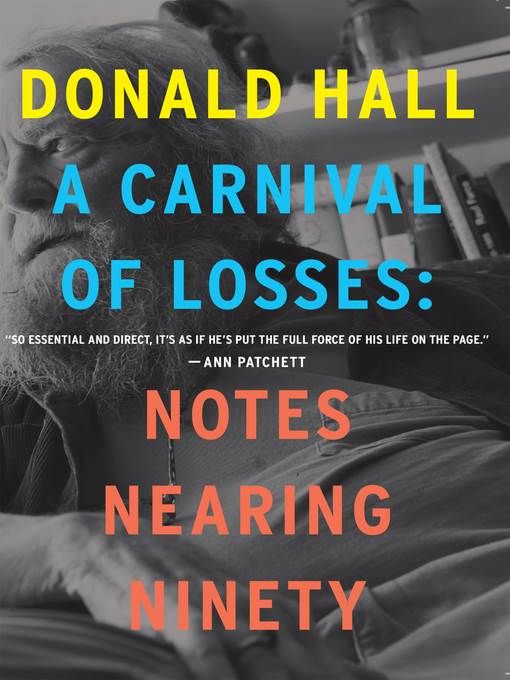
A Carnival of Losses
Notes Nearing Ninety
- اطلاعات
- نقد و بررسی
- دیدگاه کاربران
نقد و بررسی

February 15, 2018
Former U.S. poet laureate Hall had a New York Times best seller with Essays After Eighty, so why not another collection as he nears 90? Hall offers a veritable sparkling necklace of pieces on aging, solitude, and the surprising joys of both, interspersed and embellished by memories.
Copyright 2018 Library Journal, LLC Used with permission.

April 15, 2018
A joyful, wistful celebration of poetry, poets, and a poet's life.Personal matters that former poet laureate Hall wrote about in Essays After Eighty (2014, etc.) pop up again, this time with a greater sense of urgency: "As I write toward my nineties I shed my skin. I tell short anecdotes, I hazard an opinion, speculate, assume, and remember. Why should the nonagenarian hold anything back?" In the book's fourth section, "A Carnival of Losses," the author returns to stories about his New Hampshire life, relatives, friends, his appearances on Garrison Keillor's radio show (where once--off air--they traded dirty limericks, watching baseball, and interviewing Boris Karloff in high school. Also included here is his somber and poignant New Yorker piece, "Necropoetics," largely about his wife, poet and translator Jane Kenyon, who died in 1995. "Poetry begins with elegy," he writes, as he ruminates on the subject. Poetasters will enjoy his "The Selected Poets of Donald Hall" section, pithy, sharp, and gossipy profiles and anecdotes about poets he has known and met, some slight--e.g., "my recollections of some poets are brief. Allen Tate always looked grumpy." These are countered by those Hall loved, like Robert Creeley, Theodore Roethke, Seamus Heaney, and James Wright. Then there's James Dickey, the "best liar I ever knew," and Tom Clark, the "best student I ever had." Hall's admiring piece on Richard Wilbur includes a short, insightful passage on prosody in Andrew Marvell's "To His Coy Mistress." The book's first section, "Notes Nearing Ninety," shows off Hall's humor and wit, as in "The Vaper," about how vaping helped him quit smoking (mostly), "The Last Poem," about the only time he expressed his politics in a newspaper ("it went bacterial"), and a piece about frequently losing his teeth--literally.There's much to enjoy in these exuberant "notes."
COPYRIGHT(2018) Kirkus Reviews, ALL RIGHTS RESERVED.

Starred review from April 16, 2018
Former U.S. poet laureate (2006–2007), Hall reflects on aging and death in this candid and often humorous memoir. Hall meanders over mundane losses in his life—the demise of mill towns, the root cellar in his New Hampshire home—as well as the death of his wife, poet Jane Kenyon, 20 years ago, and the poets he has known. In a meditative opening, Hall says about aging, “you are old when the waiter doesn’t mention that you are holding the menu upside down,” and notes that “in your eighties you take two naps a day. Nearing ninety you don’t count the number of naps.” He reminisces about various poets he’s known: James Dickey was “the best liar I ever knew”; Allen Tate “always looked grumpy”; James Wright was always passionate about literature. Hall no longer writes poetry or essays, but prefers to write about his life and experiences and “tell short anecdotes.... why should the nonagenarian hold anything back?” In the longest section, “Necropoetics,” Hall bares his grief during his wife’s prolonged death from cancer, recognizing how much her voice still lives in his own, “spiraling together images and diphthongs of the dead who were once the living, our necropoetics of grief and love in the unforgivable absence of flesh.” Hall’s ruminative and detailed reflections on life make this a fantastic follow-up to his Essays After Eighty.




دیدگاه کاربران